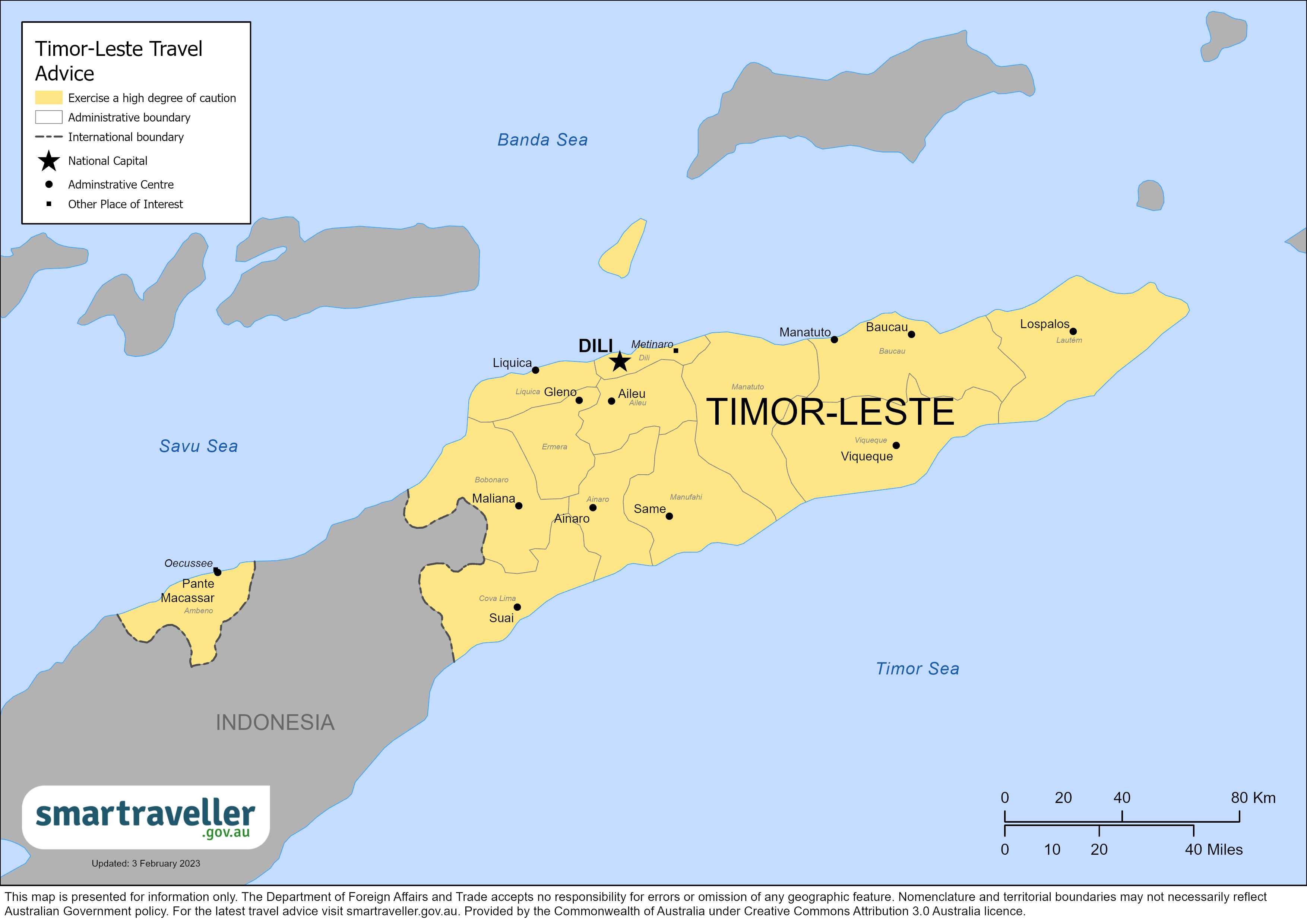West Timor
If you’re travelling to West Timor or other parts of Indonesia, read our travel advice for Indonesia.
Religious and cultural sites
You need permission to visit some places that have special religious or cultural importance.
Check with local authorities before you visit.
Check local reactions to your presence and activities and adjust accordingly.
Driving permit
To drive in Timor-Leste, you need both:
- a valid International Driving Permit (IDP)
- your current Australian driver’s licence
Get your IDP before you leave Australia.
Driving without an IDP could invalidate your travel and vehicle insurance.
After 3 months, you’ll need to get a local licence.
Road travel
Driving conditions are dangerous because of:
- bad roads
- heavy traffic
- poor signage
- a lack of street lighting
In rural areas, dangers include:
- sinking ground
- large potholes
- pedestrians and animals on the road
- vehicles without headlights
You’re more likely to die in a motor vehicle accident in Timor-Leste than in Australia.
Large crowds can form quickly after traffic accidents. The situation can become violent with little warning.
Main routes are often single-lane mountain roads. They can worsen quickly and become blocked. This can happen more readily in the rainy season from November to April.
Outside Dili, Australian officials travelling for work don’t drive at night other than in exceptional situations.
Outside Dili, there are limited emergency response resources.
Check security and road conditions with local authorities before you travel.
Make sure you have adequate insurance cover before driving in Timor-Leste.
If you drive:
- learn local traffic laws and driving practices
- always carry your car registration papers and driver’s licence
- always keep car windows up and doors locked
- travel in convoy in regional areas
- follow the advice of local authorities
If you’re in an accident, report it to the local police.
More information:
Traffic disruptions
Traffic disruptions and blocks on major thoroughfares can happen.
Police can set up checkpoints anywhere. Makeshift barricades are sometimes used as unauthorised roadblocks.
Police may close roads in Dili during large events, such as commemorative ceremonies or major sporting events.
Motorcycles
Check if your travel insurance policy covers you when riding a motorbike.
Always wear a helmet.
Taxis
Many taxis are in poor condition. Driving standards are often poor. If you choose to use taxis, seek local advice on recommended companies.
You’re at risk of robbery, sexual harassment and sexual assault in a taxi.
It’s safer to arrange limousines or hire cars through your hotel.
Avoid using taxis, especially if you’re a woman.
Public transport
Many buses, ‘microlets’ and trucks used as public transport are not well maintained.
Poor driving standards add to the risk.
Sea travel
Travel by boat can be dangerous.
Not all vessels are seaworthy.
Passenger limits are sometimes exceeded. Don’t get on or stay on an overloaded vessel.
Before booking sea travel, confirm that vessel maintenance and safety standards are maintained.
There may not be enough life jackets on board. Make sure any vessel you board is carrying safety equipment, including enough life jackets for all crew, passengers and children.
Some cruise lines have stopped over in Timor-Leste.
More information:
Piracy
Piracy happens in South-East Asian waters.
The International Maritime Bureau publishes piracy reports.
Avoid trouble spots and take safety precautions.
Air travel
Airport infrastructure across the country may be maintained to a different standard than in Australia, including emergency response vehicles.
DFAT doesn’t provide information on the safety of individual commercial airlines or flight paths.
Check Timor-Leste’s air safety profile with the Aviation Safety Network.
More information:

